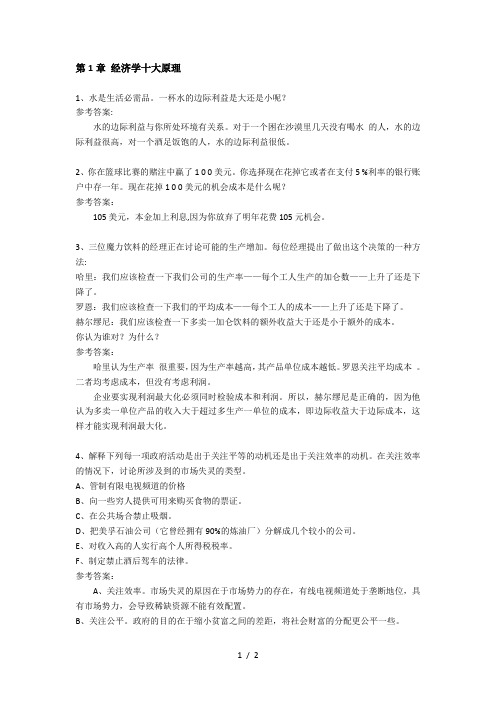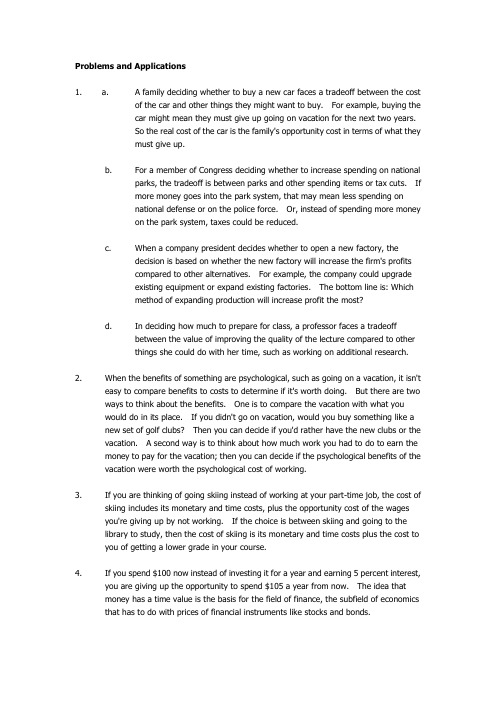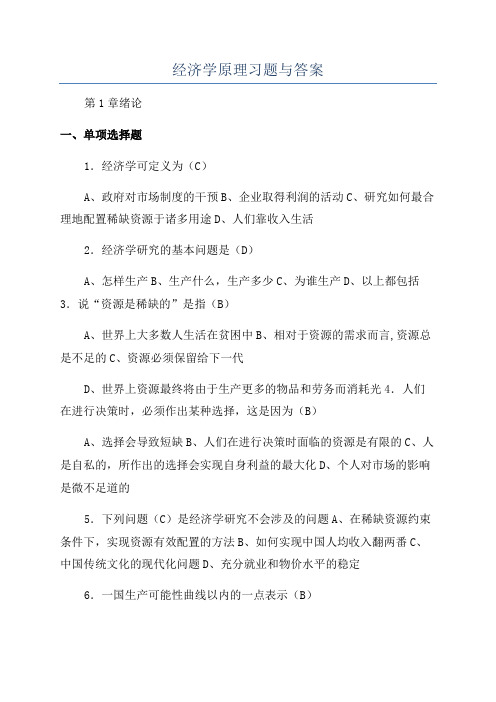经济学原理课程第一章作业及答案
经济学原理 第一章习题

结论:
A
分析:
微观经济学则研究均衡价格的理论,研究商品
的价格如何决定,以及价格如何调节整个经济 的运行。 宏观经济学研究整个经济的运行,采用总量分 析的方法,是以国民收入决定为核心来说明资 源如何才能充分利用的一系列有内在联系的理 论。所以A属于微观经济学的研究内容。
B是实证表述,因为它只是客观的描述了一个现象,说明
了是什么的问题,并不涉及到应该提高还是降低利率的问 题。 C是规范表述,因为强调效率更重要就表明认为一个经济 应该是效率优先。
D是实证表述,因为它只说明了效率是什么。
E是实证表述,因为这也是对一种客观现象的描述,不涉 及收入差别扩大时候应该的问题。
• EX.6
当经济位于生产可能性边界之上时,下列选项不正 确的是( ) A.在不减少其他产品生产的条件下不可能增加某 种产品的产量 B.资源得到充分的利用 C.该经济的生产是有效率的 D.消费者可获得所需的一切 F.工人罢工将导致该经济的生产位于生产可能性 边界以下
结论:
D
分析:生产可能性边界是社会现有技术水平上 充分有效的利用一切资源所能生产的各种物品 按不同的比例组合的最大可能产量。可见,生 产可能性曲线由技术水平和可用资源量决定。 生产可能性边界表示社会生产在现有条件下的 最佳状态。失业、低效率、资源浪费使生产处 于生产可能性边界以内。
时也有这笔支出。C不是机会成本,应为无
论是否参加婚礼,午餐不能不吃。D是机会
成本,因为是为了参加婚礼而放弃的哲学讲
座。
• EX.3
当经济学家说人们是理性的时候,这是指( ) A.人们不会作出错误的判断 B.人们总会从自己的角度作出最好的决策 C.人们根据完全的信息而行事 D.人们不会为自己所作出的任何决定而后 悔
经济学原理课后题答案第一章

第1章经济学十大原理1、水是生活必需品。
一杯水的边际利益是大还是小呢?参考答案:水的边际利益与你所处环境有关系。
对于一个困在沙漠里几天没有喝水的人,水的边际利益很高,对一个酒足饭饱的人,水的边际利益很低。
2、你在篮球比赛的赌注中赢了1 0 0美元。
你选择现在花掉它或者在支付5 %利率的银行账户中存一年。
现在花掉1 0 0美元的机会成本是什么呢?参考答案:105美元,本金加上利息,因为你放弃了明年花费105元机会。
3、三位魔力饮料的经理正在讨论可能的生产增加。
每位经理提出了做出这个决策的一种方法:哈里:我们应该检查一下我们公司的生产率——每个工人生产的加仑数——上升了还是下降了。
罗恩:我们应该检查一下我们的平均成本——每个工人的成本——上升了还是下降了。
赫尔缪尼:我们应该检查一下多卖一加仑饮料的额外收益大于还是小于额外的成本。
你认为谁对?为什么?参考答案:哈里认为生产率很重要,因为生产率越高,其产品单位成本越低。
罗恩关注平均成本。
二者均考虑成本,但没有考虑利润。
企业要实现利润最大化必须同时检验成本和利润。
所以,赫尔缪尼是正确的,因为他认为多卖一单位产品的收入大于超过多生产一单位的成本,即边际收益大于边际成本,这样才能实现利润最大化。
4、解释下列每一项政府活动是出于关注平等的动机还是出于关注效率的动机。
在关注效率的情况下,讨论所涉及到的市场失灵的类型。
A、管制有限电视频道的价格B、向一些穷人提供可用来购买食物的票证。
C、在公共场合禁止吸烟。
D、把美孚石油公司(它曾经拥有90%的炼油厂)分解成几个较小的公司。
E、对收入高的人实行高个人所得税税率。
F、制定禁止酒后驾车的法律。
参考答案:A、关注效率。
市场失灵的原因在于市场势力的存在,有线电视频道处于垄断地位,具有市场势力,会导致稀缺资源不能有效配置。
B、关注公平。
政府的目的在于缩小贫富之间的差距,将社会财富的分配更公平一些。
C、关注效率。
吸烟的人会对不吸烟的人的身体健康造成损害,这是一种经济外部性的体现,外部性的存在会导致市场失灵,从而影响市场效率。
经济学原理 曼昆课后答案 chapter 1

Problems and Applicat ions1. a. A family deciding whether to buy a new car faces a tradeoff between the costof the car and other things they might want to buy. For example, buying thecar might mean they must give up going on vacation for the next two years.So the real cost of the car is the family's opportunity cost in terms of what theymust give up.b. For a member of Congress deciding whether to increase spending on nationalparks, the tradeoff is between parks and other spending items or tax cuts. Ifmore money goes into the park system, that may mean less spending onnational defense or on the police force. Or, instead of spending more moneyon the park system, taxes could be reduced.c. When a company president decides whether to open a new factory, thedecision is based on whether the new factory will increase the firm's profitscompared to other alternatives. For example, the company could upgradeexisting equipment or expand existing factories. The bottom line is: Whichmethod of expanding production will increase profit the most?d. In deciding how much to prepare for class, a professor faces a tradeoffbetween the value of improving the quality of the lecture compared to otherthings she could do with her time, such as working on additional research.2. When the benefits of something are psychological, such as going on a vacation, it isn'teasy to compare benefits to costs to determine if it's worth doing. But there are two ways to think about the benefits. One is to compare the vaca tion with what youwould do in its place. If you didn't go on vacation, would you buy something like anew set of golf clubs? Then you can decide if you'd rather have the new clubs or the vacation. A second way is to think about how much work you had to do to earn the money to pay for the vacation; then you can decide if the psychological benefits of the vacation were worth the psychological cost of working.3. If you are thinking of going skiing instead of working at your part-time job, the cost ofskiing includes its monetary and time costs, plus the opportunity cost of the wagesyou're giving up by not working. If the choice is between skiing and going to thelibrary to study, then the cost of skiing is its monetary and time costs plus the cost to you of getting a lower grade in your course.4. If you spend $100 now instead of investing it for a year and earning 5 percent interest,you are giving up the opportunity to spend $105 a year from now. The idea thatmoney has a time value is the basis for the field of finance, the subfield of economics that has to do with prices of financial instruments like stocks and bonds.5. The fact that you've already sunk $5 million isn't relevant to your decision anymore,since that money is gone. What matters now is the chance to earn profits at themargin. If you spend another $1 million and can generate sales of $3 million, you'llearn $2 million in marginal profit, so you should do so. You are right to think that the project has lost a total of $3 million ($6 million in costs and only $3 million in revenue) and you shouldn't have started it. That's true, but if you don't spend the additional $1 million, you won't have any sales and your losses will be $5 million. So what matters is not the total profit, but the profit you can earn at the margin. In fact, you'd pay up to $3 million to complete development; any more than that, and you won't beincreasing profit at the margin.6. Harry suggests looking at whether productivity would rise or fall. Productivity iscertainly important, since the more productive workers are, the lower the cost pergallon of potion. Harry wants to look at average cost. But both Harry and Ron aremissing the other side of the equation−revenue. A firm wants to maximize its profits, so it needs to examine both costs and revenues. Thus, Hermione is right−it’s best to examine whether the extra revenue would exceed the extra costs. In addition,Hermione is the only one who’s thinking at the margin.7. a. Since a person gets fewer after-tax Social Security benefits the greater is his orher income, there's an incentive not to save for retirement. If you save a lot,your income will be higher, and you won't get as much after-tax Social Securityincome as someone who didn't save as much. The unintended consequenceof the taxation of Social Security benefits is to reduce saving; yet the SocialSecurity system arose because of worries that people wouldn’t save enoughfor retirement.b. For the same reason, you'll tend not to work (or not work as much) after age65. The more you work, the lower your after-tax Social Security benefits willbe. Thus the taxation of Social Security benefits discourages work effort afterage 65.8. a. When welfare recipients who are able to work have their benefits cut off aftertwo years, they have greater incentive to find jobs than if their benefits were tolast forever.b. The loss of benefits means that someone who can't find a job will get noincome at all, so the distribution of income will become less equal. But theeconomy will be more efficient, since welfare recipients have a greaterincentive to find jobs. Thus the change in the law is one that increasesefficiency but reduces equity.9. By specializing in each task, you and your roommate can finish the chores more quickly.If you divided each task equally, it would take you more time to cook than it would takeyour roommate, and it would take him more time to clean than it would take you. By specializing, you reduce the total time spent on chores.Similarly, countries can specialize and trade, making both better off. For example,suppose it takes Spanish workers less time to make clothes than French workers, and French workers can make wine more efficiently than Spanish workers. Then Spainand France can both benefit if Spanish workers produce all the clothes and Frenchworkers produce all the wine, and they exchange some wine for some clothes.10. a. Being a central planner is tough! To produce the right number of CDs by theright artists and deliver them to the right people requires an enormous amountof information. You need to know about production techniques and costs inthe CD industry. You need to know each person's musical tastes and whichartists they want to hear. If you make the wrong decisions, you'll beproducing too many CDs by artists that people don't want to hear, and notenough by others.b. Your decisions about how many CDs to produce carry over to other decisions.You have to make the right number of CD players for people to use. If youmake too many CDs and not enough cassette tapes, people with cassetteplayers will be stuck with CDs they can't play. The probability of makingmistakes is very high. You will also be faced with tough choices about themusic industry compared to other parts of the economy. If you produce moresports equipment, you'll have fewer resources for making CDs. So alldecisions about the economy influence your decisions about CD production.11. a. Efficiency: The market failure comes from the monopoly by the cable TVfirm.b. Equityc. Efficiency: An externality arises because secondhand smoke harmsnonsmokers.d. Efficiency: The market failure occurs because of Standard Oil's monopolypower.e. Equityf. Efficiency: There's an externality because of accidents caused by drunkdrivers.12. a. If everyone were guaranteed the best health care possible, much more of ournation's output would be devoted to medical care than is now the case.Would that be efficient? If you think that currently doctors form a monopolyand restrict health care to keep their incomes high, you might think efficiencywould increase by providing more health care. But more likely, if thegovernment mandated increased spending on health care, the economy wouldbe less efficient because it would give people more health care than theywould choose to pay for. From the point of view of equity, if poor people areless likely to have adequate health care, providing more health care wouldrepresent an improvement. Each person would have a more even slice of theeconomic pie, though the pie would consist of more health care and less ofother goods.b. When workers are laid off, equity considerations argue for the unemploymentbenefits system to provide them with some income until they can find new jobs.After all, no one plans to be laid off, so unemployment benefits are a form ofinsurance. But there’s an efficiency problem why work if you can getincome for doing nothing? The economy isn’t operating e fficiently if peopleremain unemployed for a long time, and unemployment benefits encourageunemployment. Thus, there’s a tradeoff between equity and efficiency. Themore generous are unemployment benefits, the less income is lost by anunemployed person, but the more that person is encouraged to remainunemployed. So greater equity reduces efficiency.13. Since average income in the United States has roughly doubled every 35 years, we arelikely to have a better standard of living than our parents, and a much better standard of living than our grandparents. This is mainly the result of increased productivity, so that an hour of work produces more goods and services than it used to. Thusincomes have continuously risen over time, as has the standard of living.14. If Americans save more and it leads to more spending on factories, there will be anincrease in production and productivity, since the same number of workers will havemore equipment to work with. The benefits from higher productivity will g o to boththe workers, who will get paid more since they're producing more, and the factoryowners, who will get a return on their investments. There's no such thing as a freelunch, though, because when people save more, they're giving up spending. They get higher incomes at the cost of buying fewer goods.15. a. If people have more money, they're probably going to spend more on goodsand services.b. If prices are sticky, and people spend more on goods and services, then outputmay increase, as producers increase output to meet the higher demand ratherthan raising prices.c. If prices can adjust, then people's higher spending will be matched withincreased prices, and output won't rise.16. To make an intelligent decision about whether to reduce inflation, a policymaker wouldneed to know what causes inflation and unemployment, as well as what determines the tradeoff between them. Because prices are sticky, an attempt to reduce inflation willlead to higher unemployment. A policymaker thus faces a tradeoff between the benefits of lower inflation compared to the cost of higher unemployment.。
经济学原理(第一章)备考题及答案

经济学原理(第一章导言)习题单选题1.一国生产可能性曲线以内的一点表示()。
A、通货膨胀B、失业或者说资源没有被充分利用C、该国可利用的资源减少以及技术水平降低D、一种生产品最适度产出水平2.经济问题强调在竞争性目的之间做出选择,这意味着必须牺牲某些选择,一种行为的机会成本是()。
A、所放弃的各种选择的价值之总和B、必须牺牲的次佳选择之收益C、所采取的行为的价值减去次佳选择的价值后的余额D、你今天所做的加上你明天所做的3.经济学研究的基本问题是()。
A、证明只有市场系统可以配置资源B、选择最公平的收入分配方法C、证明只有计划经济可以配置资源D、因为资源稀缺而必须作出的选择4.某先生辞去月薪1 000元的工作,取出自有存款100 000元(月息1%),办一独资企业,如果不考虑商业风险,则该先生自办企业按月计算的机会成本是()。
A、2 000元B、100 000元C、1 000元D、101 000元5.选择具有重要性,基本上是因为()。
A、人们是自私的,他们的行为是为了个人利益B、选择导致稀缺C、用于满足所有人的资源是有限的D、政府对市场经济的影响有限6.稀缺性的主要含义是()。
A、一个人不应该把今天能买到的东西留到明天买B、必须作出选择C、需要用政府计划来决定资源的运用D、政府计划无法决定如何运用资源7.时间()。
A、不是稀缺资源,因为永远有明天B、与资源分配决策无关C、对生产者是稀缺资源,但对消费者不是D、对任何人都是稀缺资源8.经济物品是指()。
A、有用的物品B、稀缺的物品C、要用钱购买的物品D、有用且稀缺的物品9.以下问题中哪一个不是微观经济学所考察的问题?A、一个厂商的产出水平B、失业率的上升或下降C、联邦货物税的高税率对货物销售的影响D、某一行业中雇佣工人的数量10.生产可能性曲线说明的基本原理是()。
A、一国资源总能被充分利用B、假定所有经济资源能得到充分利用,则只有减少Y物品的生产才能增加X物品的生产C、改进技术引起生产可能性曲线向内移动D、经济能力增长惟一决定于劳动力数量。
经济学原理习题与答案

经济学原理习题与答案第1章绪论一、单项选择题1.经济学可定义为(C)A、政府对市场制度的干预B、企业取得利润的活动C、研究如何最合理地配置稀缺资源于诸多用途D、人们靠收入生活2.经济学研究的基本问题是(D)A、怎样生产B、生产什么,生产多少C、为谁生产D、以上都包括3.说“资源是稀缺的”是指(B)A、世界上大多数人生活在贫困中B、相对于资源的需求而言,资源总是不足的C、资源必须保留给下一代D、世界上资源最终将由于生产更多的物品和劳务而消耗光4.人们在进行决策时,必须作出某种选择,这是因为(B)A、选择会导致短缺B、人们在进行决策时面临的资源是有限的C、人是自私的,所作出的选择会实现自身利益的最大化D、个人对市场的影响是微不足道的5.下列问题(C)是经济学研究不会涉及的问题A、在稀缺资源约束条件下,实现资源有效配置的方法B、如何实现中国人均收入翻两番C、中国传统文化的现代化问题D、充分就业和物价水平的稳定6.一国生产可能性曲线以内的一点表示(B)A、通货膨胀B、失业或资源没有被充分利用C、该国可利用的资源减少以及技术水平降低D、一种生产品最适度水平7.下列各项中(C)会导致一国生产可能性曲线向外移动A、失业B、通货膨胀C、有用性资源增加或技术进步D、消费品生产增加,资本物品生产下降8.下列命题中(C)不是实证经济学命题A、1982年8月联储把贴现率降到10%B、1981年失业率超过9%C、联邦所得税对中等收入家庭是不公平D、社会保险税的课税依据已超过30000美元9.下列(B)是规范经济学的说法A、医生挣的钱比蓝领工人多B、收入分配中有太多的不公平现象C、从1999年开始,中国的物价水平基本保持稳定状态,这一现象也许会保持到2005年D、如果在20世纪80年代中期你购买了微软公司的1000股股票,现在你愿意出售的话,你肯定赚不少钱10.由市场配置资源意味着(B)A、所有的人都会得到他想要的东西B、资源的配置是由市场机制实现的C、政府能够决定谁获得多少消费品D、要得到急需的物品你只能“走后门”11.西方学者认为现代美国经济是一种(C)A、完全的自由放任经济制度B、严格的计划经济制度C、混合资本主义市场经济制度D、自给自足制度二、判断正误1.只有落后国家才存在资源的稀缺性和供给的短缺现象。
《经济学原理》练习题、答案(可编辑修改word版)

《经济学原理》练习题、答案(可编辑修改word版)《经济学原理》总目录第一篇导论第一章导论第二篇微观经济理论第二章需求、供给与均衡第三章消费者行为理论第四章生产者行为理论第五章产品市场理论第六章生产要素理论第七章微观经济政策第三篇宏观经济理论第八章国民收入的核算与决定理论第九章失业与通货膨胀理论第十章经济周期与经济增长理论第十一章宏观经济政策第十二章开放经济第一章导论一、单项选择1、作为经济学的两个组成部分,微观经济学与宏观经济学是()A.互相对立的B.没有任何联系的C.相互补充的D.部分联系的2、古典经济学家亚当·斯密所谓的“看不见的手”是指()A.技术B.信息C.价格D.行政命令3、经济学研究的基本问题是()A.生产什么B.如何生产C.为谁生产D.以上都是4、资源的稀缺性是指()。
A.世界上的资源最终会由于人们生产更多的物品而消耗光B.相对于人们无穷的欲望而言,资源总是不足的C.生产某种物品所需资源的绝对数量很少D.由于存在资源浪费而产生的稀缺5、微观经济学解决的问题是()。
A.资源配置B.资源利用C.市场出清D.完全理性6、宏观经济学的中心理论是()。
A.失业理论B.通货膨胀理论C.国民收入决定理论D.经济增长理论7、关于实证经济学与规范经济学说法正确的是()A.两者并不是绝对相互排斥的,而应当是相互补充的。
B.规范经济学是以实证经济学为基础,而实证经济学则是以规范经济学作为指导的。
C.一般来说,越是具体的问题,实证的成分越多,而越是高层次的、决策性的问题,就越具有规范性。
D.以上说法都对二、多项选择1、微观经济学的主要内容包括()A.体格决定理论B.消费者行为理论C.生产者行为理论D.市场理论和分配理论等2、宏观经济学的基本内容有()A.宏观经济政策B.经济周期与增长理论C.国民收入决定理论D.失业与通货膨胀理论3、下列关于资源稀缺性的正确的说法有()A.资源稀缺性是相对于欲望的无限性而言的B.地球上的资源本来就少C.资源稀缺性存在于世界各地D.资源稀缺性存在于人类历史的各个时期三、判断题1、资源的稀缺性决定了资源可以得到充分的利用,不会出现资源浪费的现象。
经济学原理第一、二章课后题答案
第一章经济学十大原理复习题:1、列举三个你在生活中面临的重要权衡取合的例子。
答:1)在生活上,比如某一天,我手上有三块钱,我是买一个冷饮呢?还是买一瓶水?2)在学习内容上,如果学习《经济学》,就要减少学习英语或其他专业课的时间。
3)在入大学填志愿时,我就面临权衡取舍,选上海师大,就放弃了上海金融学院。
2、看一场电影的机会成本是什么?答:看一场电影的机会成本是在看电影的时间里做其他事情所能获得的最大收益,例如:读书、打工。
3、水是生活必需的。
一杯水的边际利益是大还是小呢?答:这要看这杯水是在什么样的情况下喝.如果这是一个人九分钟内喝下的第八杯水,那么他的边际利益很小,有可能为负;如果这是一个极度干渴的人喝下的第一杯水,那么他的边际利益将会极大。
4、为什么决策者应该考虑激励?答:因为人们会对激励做出反应。
如果政策改变了激励,它将使人们改变自己的行为,当决策者未能考虑到行为如何由于政策的原因而变化时.他们的政策往往会产生意想不到的效果。
5、为什么各国之间的贸易不像竞赛一样有赢家和输家呢?答:因为贸易使各国可以专门从事自己最擅长的话动,并从中享有更多的各种各样的物品与劳务。
通过贸易使每个国家可供消费的物质财富增加,经济状况变得更好。
因此,各个贸易国之间既是竞争对手,又是经济合作伙伴。
在公平的贸易中是“双赢”或者“多赢”的结果。
6、市场中的那只“看不见的手”在做什么呢?答:市场中那只“看不见的手”就是商品价格,价格反映商品自身的价值和社会成本,市场中的企业和家庭在做出买卖决策时都要关注价格。
因此.他们也会不自觉地考虑自己行为的(社会)收益和成本。
从而,这只“看不见的手”指引着干百万个体决策者在大多数情况下使社会福利趋向最大化。
7、解释市场失灵的两个主要原因,并各举出一个例子。
答:市场失灵的主要原因是外部性和市场势力。
外部性是一个人的行为对旁观者福利的影响。
当一个人不完全承担(或享受)他的行为所造成的成本(或收益)时,就会产生外部性。
经济学原理习题参考答案
《经济学原理》习题参考答案第一章二、选择题1C 2D 3A 4D 5C 6CD 7A 8A 9C 10B第二章二、选择题1BCD 2A 3D 4D 5BE 6C 7B 8BC9D 10C 11C 12D 13B 14CD 15B三、计算题1. (1)P e =6, Q e =20(2)P e =7, Q e =25第三章二、选择题1C 2B 3B 4A 5A 6B 7A 8A 9C10D 11B 12B 13D 14D三、计算题1. (1) ed=3/2(2) ed=2/3(3) 与(2)的结果相同2. (1)预计销售量为99.2万个单位(2)价格应下调20.83%3. ed=14. 汽油价格应上涨0.8美元第四章二、选择题1D 2C 3BC 4AD 5D 6CDE7CD 8BC 9B 10C 11AC 12A三、计算题1.解:由Q=10-2P ,可知:P=Q 215-62210211=⨯-==Q P 元时,∴ 消费者剩余CS 1为:Q P CS PdQ 00601⨯-=⎰=Q P dQ Q 006021)5(⨯--⎰= [5Q-Q241]60Q P 00⨯- =62656241⨯-⨯-⨯ =9再24210411=⨯-==Q P 元时, ∴ 消费者剩余CS2为: Q P CS PdQ 00201⨯-=⎰=[5Q-Q 241]20QP 00⨯- =24252241⨯-⨯-⨯ =12. 解: 由X YU MU Y X U MU XY U Y X =∂∂==∂∂==,可知: 再由: IY P X P Y P X P P X P Y P MU P MU Y X Y X YX Y Y X X =+=⇒=⇒= 可知 :X P IX 2= Y P I Y 2=3. X=10 Y=504. (1)X=I/2P X Y=I/2P Y(2)X=250 Y=50(3)由于参加工会后获得的总效用大于参加工会前,所以应参加工会。
经济学原理第七版习题答案
经济学原理第七版习题答案经济学原理第七版习题答案经济学是一门研究人类如何管理资源的学科,它涉及到各个方面的生产、分配和消费。
在学习经济学的过程中,习题是非常重要的一部分,它能够帮助我们巩固所学的知识,并提供实践应用的机会。
本文将为大家提供经济学原理第七版习题的答案,希望对大家的学习有所帮助。
第一章:经济学原理1. 什么是经济学?经济学是研究人们如何选择以满足无限需求的学科。
它涉及到资源的利用、生产和分配等方面。
2. 什么是机会成本?机会成本是指为了获得某种东西而放弃的其他可选择的最高价值的东西。
它反映了资源的稀缺性和人们在做出选择时所面临的权衡。
3. 什么是边际效益?边际效益是指增加或减少一个单位的某种物品或服务所带来的额外效益。
它是经济学中的重要概念,可以帮助我们做出最优的决策。
第二章:供求关系和市场机制1. 什么是需求曲线?需求曲线是指在一定时间内,消费者愿意购买某种商品或服务的数量与其价格之间的关系。
需求曲线通常是向下倾斜的,这是因为随着价格的上升,消费者对商品的需求会减少。
2. 什么是供给曲线?供给曲线是指在一定时间内,生产者愿意出售某种商品或服务的数量与其价格之间的关系。
供给曲线通常是向上倾斜的,这是因为随着价格的上升,生产者愿意提供更多的商品。
3. 什么是市场均衡?市场均衡是指市场上的需求和供给达到平衡状态的情况。
在市场均衡下,商品的价格和数量会达到一个稳定的水平,供求双方都能够得到满足。
第三章:市场效率和政府干预1. 什么是市场失灵?市场失灵是指市场机制在资源配置中出现了问题,导致资源的分配不够有效。
市场失灵的原因可以是外部性、公共物品、垄断等。
2. 什么是外部性?外部性是指某个经济主体的行为对其他经济主体产生的影响,这种影响不通过市场价格进行衡量。
外部性可以是正面的,如教育的外部效益;也可以是负面的,如污染的外部成本。
3. 什么是公共物品?公共物品是指任何人都可以使用,并且一个人的使用不会减少其他人使用的物品。
经济学第一章习题集并课后习题 - 附参考答案
课后习题答案:1、(1)P=3,Q=4; (2)|Ed|=3/2; (3)征税12、(1)X需求曲线为X=500/Px; (2)X=20, Y=50第一部分:需求和供给单选题0、生产可能性曲线上任何一点都隐含着资源配置是()A.效率最大B.无效率C.有效率,但效率最低D.不一定1、影响需求量的主要因素中不包括( )A.产品价格B.消费者收入C.广告费用D.产品成本2、当需求的收入弹性为负值时,则这种产品应为( )A.低档货B.高档货C.正常货D.都有可能3、某企业生产甲、乙两种产品。
在企业现有资源的条件下,当生产甲产品12000单位时,可生产乙产品9000单位;当甲产品产量提高到14000单位时,乙产品的产量最大可达6000单位。
则乙产品转换为甲产品的边际转换率为( )A.0.15B.6.67C.1.5D.0.6674、影响供给量的主要因素不包括( )A.产品价格B.产品成本C.生产者对价格的预期D.消费者对未来价格的预期5、下列产品中,( )的收入弹性最大。
A.大米B.棉布C.高级工艺品D.食盐6、当某种商品处于( )时,不管价格上升还是下降,其销售收入均保持不变。
A.弹性需求B.单元弹性需求C.非弹性需求D.价格弹性大于17、下面哪种情况将导致供给的减少( )。
A.消费者收入的增加B.采用更加先进的技术C.消费者收入的减少D.生产成本的上升8、下列哪一项会导致粮食制品的均衡价格的下降?()A.鸡蛋价格的增加B.良好的气候条件C.牛奶价格的下降D.收入的增加10、若需求曲线为一直线,则当价格从高到低不断下降时,卖者的总收益()A. 不断增加B. 在开始时增加,达到最大值后趋于减少C. 不断减少D. 在开始时趋于减少,达到最小值后趋于增加11、收入和偏好是()A. 影响供给的因素B. 影响需求的因素C. 在经济分析中可以忽略D. 上述都不准确12、导致需求量沿商品的需求曲线变动的现象发生的情况是()A. 购买者的收入增加时B. 其它商品价格变化时C. 购买者的偏好变化时D. 当该商品价格下降时13、当社会上各种商品的供求平衡时,价格上涨( )A.能刺激生产,不能抑制需求B.不能刺激生产,能抑制需求C.能刺激生产,能抑制需求D.不能刺激生产,不能抑制需求14、提价1倍后,对需求量不会有很大影响的商品是( )A.彩电B.自行车C.食盐D.高级服装15、在得出某种商品的个人需求曲线时,不保持...为常数的因素是()A. 个人收入B. 其余商品的价格C. 所考虑商品的价格D. 个人偏好16、销售收入与产品价格之间的关系为()A. 产品价格上涨时,产品销售收入一定增加B. 产品价格上涨时,产品销售收入一定减少C. 产品价格上涨时,产品销售收入可能增加,也可能减少D. 产品价格上涨时,产品销售收入一定保持不变17、不会..使需求曲线移动的因素是()A.消费者收入的增加B.商品价格下降C.其他有关商品价格下降D.消费者偏好变化18、需求和供给同时减少的情况下()A.均衡价格的变化无法确定,均衡交易量将下降B.均衡价格将下降,均衡交易量的变化无法确定C.均衡价格和均衡交易量都将下降D.均衡价格将上升,均衡交易量将下降19、在某一时期内彩色电视机的需求曲线向左平移的原因是()A.彩色电视机的价格上升B.消费者对彩色电视机的预期价格上升C.消费者对彩色电视机的预期价格下降D.黑白电视机的价格上升20、下列哪种情况会导致需求曲线向左移?( )A. 互补商品价格涨价B. 消费者收入水平增加C. 消费者对该商品的偏好上升D. 替代商品价格上涨21、如果政府干预市场,并对某种竞争性商品实现最高限价,则会有( )A. 供大于求B. 排队购买该商品C. 厂商增加D. 市场垄断补21、高于均衡价格的现象说明()A、市场处于一种供大于求的状态;B、市场处于一种供不应求的状态C、市场处于一种既不是供大于求,又不是供不应求的状态D、市场处于一种出清的状态22、某商品的价格从5美元下降到4美元,需求量增加了100单位,需求为()A.缺乏弹性;B.富有弹性;C.不能确定; D. 单位弹性;23、收入的增加会导致( )。
- 1、下载文档前请自行甄别文档内容的完整性,平台不提供额外的编辑、内容补充、找答案等附加服务。
- 2、"仅部分预览"的文档,不可在线预览部分如存在完整性等问题,可反馈申请退款(可完整预览的文档不适用该条件!)。
- 3、如文档侵犯您的权益,请联系客服反馈,我们会尽快为您处理(人工客服工作时间:9:00-18:30)。
经济学原理第一章练习题及答案
一.单项选择题
1.一个经济体系必须做出的基本选择是:
A生产什么,生产多少 B如何生产 C为谁生产 D以上都包括
2.经济学可定义为:
A政府对市场制度的干预 B企业赚取利润的活动
C研究稀缺资源如何有效配置的问题 D个人的生财之道
3.研究某个厂商、某种产品和单个居民行为的经济学被称为:
A规范经济学 B实证经济学 C宏观经济学 D微观经济学
4.研究一个国家整体经济运行的经济学被称为:
A规范经济学 B实证经济学 C宏观经济学 D微观经济学
5.经济学中的三个主要市场是:
A股票市场、产品市场和劳动力市场 B股票市场、外汇市场和劳动力市场
C资本市场、外汇市场和劳动力市场 D资本市场、产品市场和劳动力市场
6.宏观经济学要解决的问题是:
A.资源配置
B.资源利用
C.整个经济如何实现最大化
D.国民收入的决定
7.实证经济学主要回答国民经济:
A应该如何运行 B实际如何运行 C应该是什么 D应该怎样
8.“资源是稀缺的”是指
A 资源是不可再生的
B 资源必须留给下一代
C 资源终将被耗费殆尽
D 相对于需求而言,资源总是不足的
9.下面哪一项不属于微观经济学的研究对象:
A计算机产业的价格决定 B 通货膨胀率的决定
C 一家光碟厂商的产量水平
D 广告业雇员人数
10.宏观经济学的观点:
A 包括对经济个体单位行为的分析
B 研究消费者和厂商如何决策
C 是以自上而下的角度分析经济
D 是以自下而上的角度分析经济
1.D
2.C
3.D
4.C
5.D
6.B
7.B
8.D
9.B 10.C
二.填空题
1.微观经济学研究的对象单个经济单位,解决的问题是资源配置;宏观经济学研究的对象整个经济,解决的问题是资源利用。
2.实证经济学回答是什么问题,规范经济学回答应该是什么问题。
3.需求的无限性与生产的有限性就引出了经济学上的一个重要概念稀缺性;它是相对的
4.得到某种东西的成本是为了得到它所放弃的东西,经济学中把这种成本称为机会成本。
5.在经济学中应用最广泛的实证分析工具是均衡分析、非均衡分析、动态分析、
静态分析。
三.判断题
①需求的无限性与生产的有限性引出了稀缺性这个概念。
(√)
②经济学最基本的内容有:均衡价格理论、消费者行为理论、生产理论、
分配理论以及围观经济政策。
(×)
③微观经济学通常研究如何充分利用的问题,而宏观经济学通常研究资源配置的问题。
(×)
④微观经济学的中心理论是国民收入决定理论。
(×)
⑤实证经济学要回答“应该是什么的问题”,而规范经济学回答的是“是什么”的问题。
(×)
⑥理论的表述方式有口述法、算术表示法、几何等价法,代数表达法。
(√)
⑦微观经济学与宏观经济学都是用规范的方法进行研究,因此,都属于规范经济学。
(×)
四.简答题
1.每个经济体系都面临的基本选择有哪些?
2.微观经济学为什么又叫价格理论?
3.什么是经济理性假定?为何要做出假定?
一.答:面临的选择有生产什么如何生产为谁生产者三个问题
二.答:在市场经济中,个体和商户的行为都受到价格的影响,价格调节着整个市场的经济活动,通过价格的调节社会资源配置实现了最优化。
微观经济学就是要说明价格如何使资源配置达到最优化。
因此价格理论是微观经济学的中心,微观经济学又叫价格理论。
三.答:经济理性主义假定人在经济生活中总是受到利己之心驱使,通过对各种可能方案的理性选择,以便寻求能够实现最大限度利益的最优方案。
通过经济理性主义假定,这就撇开了人类行为的其他动机,赋予个人以“经济人”的行动目标,从而可以抓住主要问题,建立起一整套经济理论体系。
这种抽象的方法是科学赖以建立和发展的重要基础。
